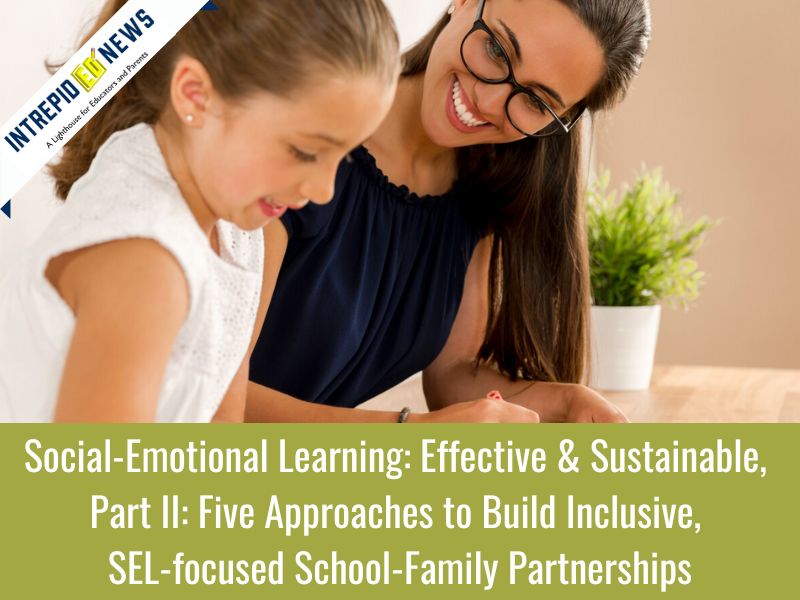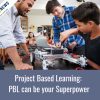Social-Emotional Learning: Effective & Sustainable
Part II: Five Approaches to Build Inclusive, SEL-focused School-Family Partnerships
This article is republished with permission from IntrepidEd News
Nick Haisman-Smith
Parent and caregiver involvement in their child’s education has well-evidenced, positive outcomes on a wide range of factors — academic, personal, social, and emotional. Schools around the world work tirelessly to form strong school/family partnerships — from welcoming new families, bringing families to campus for events and celebrations, and working closely to support students and families during difficult times.
When it comes to the SEL dimensions of a school’s partnership with parents and caregivers, there are a number of factors to consider — to truly take SEL beyond the classroom. I have written earlier about the in-school principles that underpin effective SEL. In this article, I want to explore five approaches that help to bring SEL alive, outside of the classroom, throughout your parent and caregiver community.
1. “No two families are the same” — name and celebrate diversity in our family structures and backgrounds.
In planning work with families, schools can build a strong foundation by celebrating the diversity of family structures and backgrounds that exist in communities and finding ways to lift up, amplify, and celebrate diverse voices. This foundation often involves thinking carefully about your language (parents and caregivers, instead of moms and dads, for example), and working to build a diverse and representative parent community, and Parent Association. It is also crucial to plan for language or sign interpreters in communications and in-person parent events.
2. “I didn’t have SEL as a kid” — build a shared language and understanding.
Most parents and caregivers today probably didn’t have SEL as a formal or named part of their own education. As such, parents usually come to this work with a wide range of views, assumptions, and even misconceptions about what SEL is and what it isn’t. Common misconceptions we hear are that SEL takes time away from academics, is for ‘troubled kids,’ or that it is a behavior management tool.
SEL is of course none of these — it is a universal offer to support all students to build essential skills and competencies. Parents and caregivers need the opportunity to learn the what (definition/meaning), why (evidence), and how (tools and practices) for SEL. Avoiding jargon or ‘edu-speak’ is also important to keep our parents and caregivers engaged and feeling a sense of belonging.
3. “Is SEL a class, like math?” — communicate little and often, to share what SEL skills students are learning in school.
Parents and caregivers often wonder what is really taught in an SEL curriculum. It is therefore so important for there to be regular communication with families to explain the skills that are being taught, with plenty and varied examples. Good practices include:
- Regular newsletters and/or videos, sharing what SEL skills have been explored and suggestions for parents of ways they may continue the conversations at home. These should be translated to other languages to ensure all parents and caregivers can access the material. Some schools have created a social media channel specifically to share this content.
- Offering a small homework assignment where students practice or teach an SEL skill they have learned with their parents at home. Good practices for this are cool-off strategies, conflict resolution tools, or a fun cooperative game.
- A Parent and Caregiver SEL Library — online or as part of the school’s library. This can be a great place to share articles, books, and resources with parents. Editor’s Note: Intrepid Ed News has a library of Parent SEL Resources accessible from the Main Menu by selecting Parent Education.
- Screenings or viewing parties of SEL-themed films. These are usually most successful when followed by discussions or Q&A sessions with guest speakers or members of school faculty.
- Communicating with families when significant, traumatic, or complex events happen that impact the school community. It is powerful and so helpful to parents when schools share what conversations have happened at school with students around these big events, and what parents and caregivers themselves can do to continue these conversations at home.
4. “How can parents actively support their child’s social and emotional development?” — Bring SEL practices alive at home.
While SEL has a vital, evolving skillset, just like other classes in school, it is also true that we never really ‘graduate’ from SEL! It is a dynamic and ongoing process, and even as adults we can learn and refine these skills to bring health and wellbeing for ourselves and those around us. Assuring parents and caregivers that children are “in progress,” not in completion, of SEL can be one of the most important roles a school plays in easing parenting anxiety about a child’s normal, age-stage development. In other words, a child’s ability to use calm down strategies will be uneven, vary greatly, and mature as the child grows and becomes more competent. It also may take a turn during adolescence and need reframing.
As parents, we also have many opportunities to bring some SEL practices into our role at home. At The Institute for Social and Emotional Learning (IFSEL), we offer a “Parent and Caregiver SEL Workshop Series” to schools, online or in-person. During this series of workshops, we invite parents to explore big themes such as:
- how to bring calm to their family when emotions run high
- how to model deep, reflective listening
- how the role of parent and caregiver can evolve as children grow and
- how to model and use healthy approaches to resolving conflict, managing mistakes, and handling setbacks
These practices, when alive in families, can be transformative, and mirror and reinforce what children are learning in school.
5. “If we want good SEL outcomes for our kids, we have to start with the adults” — the importance of focusing on parent and caregiver SEL, wellbeing, and belonging.
Being a parent and caregiver is not easy, and many parents can feel alone at times. At IFSEL, we often start our parent and caregiver workshops with a shout-out, asking what the last week of parenting has been like for them — ‘exhausting’, ‘hectic’, ‘busy’, ‘fun’, ‘challenging’, ‘joyful’ are the typical responses! Parents and caregivers, just like their children, need and want to be part of a caring and inclusive community where empathy abounds. We must take every opportunity we can to support our parents and caregivers and to bring them together to connect and reflect on their shared humanity, raising children at this moment. Some schools have launched Parent Wellness Committees through their PTAs to focus specifically on this. Others use parent-to-parent buddy systems or moderated parent panels such as IFSEL’s “Open Session” to share encouragement and ideas about real-life parenting issues relevant to that age — making friends, choosing outside activities, screen time, bedtime, homework. And other schools use parent education programs online and in-person to bring the community together.
For more information on IFSEL’s Whole Community Approach to SEL, our Parent and Caregiver SEL Workshop Series, or The Open Session, please email [email protected]


















Add comment